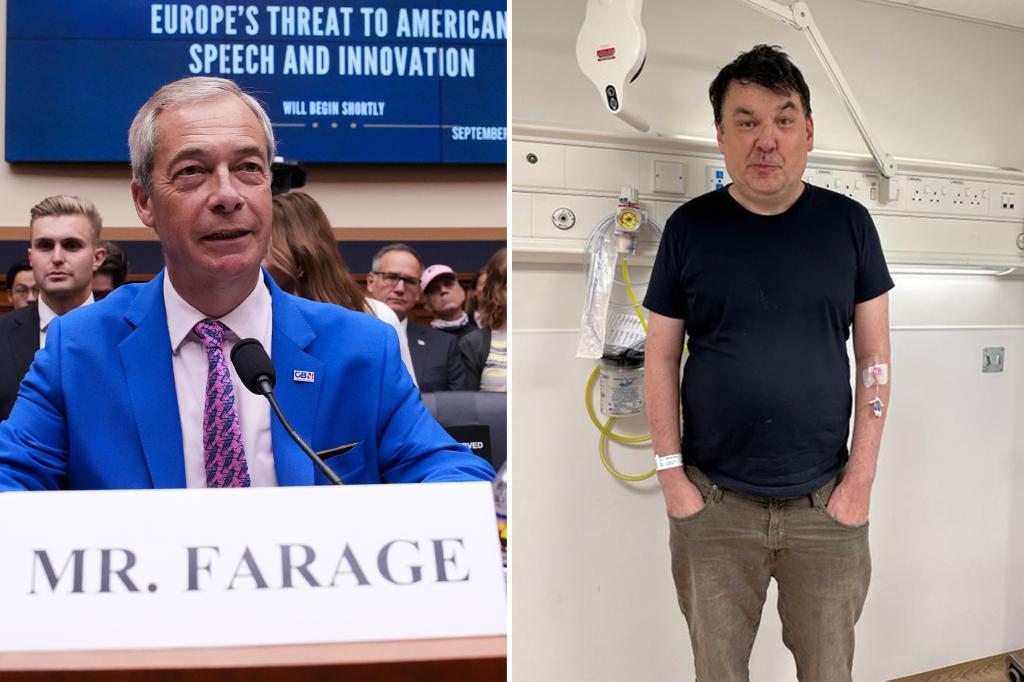WASHINGTON — British politician Nigel Farage warned Americans Wednesday they could also face censorship — and even arrest — for the social media posts just by stepping foot into the UK, like the comic who was recently busted over his “anti-trans” messages on X.
“At what point did we become North Korea?” Farage questioned about his country while testifying before the House Judiciary Committee in DC. “I think the Irish comedy writer found that out two days ago at Heathrow Airport. This is a genuinely worrying, concerning, and shocking situation.”
Farage, a member of the British Parliament whose right-wing Reform Party has been gaining support this year, was referring to Irish comedian Graham Linehan, who was cuffed at Heathrow Airport in London Monday for his posts.
“He’s not even a British citizen. He’s an Irish citizen,” Farage pointed out. “This could happen to any American man or woman that goes to Heathrow, that has said things online that the British government and British police don’t like.”
Linehan was collared for three separate posts, including one in which he joked: “If a trans-identified male is in a female-only space, he is committing a violent, abusive act. Make a scene, call the cops and if all else fails, punch him in the balls.”
Local police in a statement had claimed that the threat of violence against a protected group prompted the confrontation.
Farage visited the Judiciary panel to discuss the “awful, authoritarian situation” that many online speech laws are creating in the UK and Europe, sharing instances of Britons being arrested and even thrown in jail for their social media posts.
Judiciary Chairman Jim Jordan (R-Ohio) invited Farage to the hearing, titled “Europe’s Threat to American Speech and Innovation,” as US lawmakers consider legislation and actions to curb foreign encroachment on Americans’ free speech.
In the UK, the Online Safety Act went into effect earlier this year, prompting a clash between government officials and tech firms.
The law is mainly meant to curb harmful content — including posts that are violent or pornographic — for children and imposes age-verification measures. But fellow Reform Party member Zia Yusuf has claimed that it was written broadly enough to allow the government to determine “what speech social media companies must censor.”
Yusuf also called the legislation dystopian, while Farage has vowed to repeal it if their party wins in the next election cycle.
Free speech in the UK is not absolute, with several provisions of the Human Rights Act of 1998, which Farage also opposes, and other laws prohibiting so-called “hate speech” or words that defame, threaten or call for violence.
The online speech law could also “damage trade between our countries,” Farage claimed Wednesday.
Last Congress, Jordan and other Republican members dug deep into the policing of so-called “misinformation” and “disinformation” — both inside and outside of government — in the lead-up to the 2020 election that resulted in The Post’s bombshell scoop on Hunter Biden’s laptop being censored by Big Tech platforms.
The top Democrat on the Judiciary Committee, Rep. Jamie Raskin (D-Md.), tore into Farage at the start of the hearing and declared that there was “no free speech crisis in Britain.”
“For a man who fashions himself as some kind of a free speech martyr, Mr. Farage seems most at home with the autocrats and dictators of the world who are crushing freedom on Earth,” Raskin charged, referencing TV appearances in which the MP reportedly praised Russian President Vladimir Putin.
“The dictators of this world have nothing to fear from this hearing,” he also said. “This hearing is just a drive-by hit against a strong democratic ally to benefit a Donald Trump sycophant and wannabe.”
“I’m delighted to reacquaint with the charming Mr. Raskin,” responded Farage, who called the Democrat “the most pig-headed person he’d ever met” at a meeting two months ago in London, Politico reported.
“Delightful testimony you gave me earlier on with your speech. But hey, that’s fine, you can say what you like, I don’t care. Because that’s what free speech is,” the UK lawmaker said.
“This has all been going wrong now for a couple of decades,” he pointed out. “We’ve kind of forgotten the Voltaireian principles that we’ll fight and defend to the death your right to say something that we fundamentally disagree with.”
Read the full article here

